
Stefan Bronisław Starzyński was a Polish statesman, economist, military officer and Mayor of Warsaw before and during the Siege of 1939.
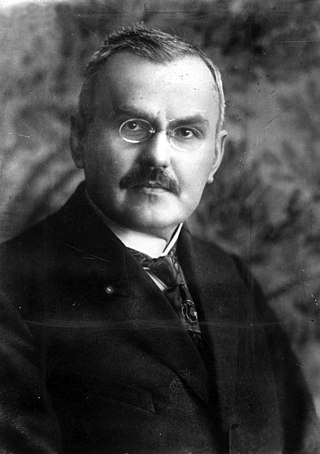
Władysław Dominik Grabski was a Polish National Democratic politician, economist and historian. He was the main author of the currency reform in the Second Polish Republic and served as Prime Minister of Poland in 1920 and from 1923 to 1925. He was the brother of Stanisław Grabski and Zofia Kirkor-Kiedroniowa.

Powszechna Kasa Oszczędności Bank Polski Spółka Akcyjna is a Polish multinational banking and financial services company headquartered in Warsaw, Poland. It is among the largest financial institutions in Poland, and is also one of the largest financial groups in Central and Eastern Europe, with 1,145 branches located in Poland and abroad and a market capitalization of PLN 52 billion as of 2018.

The energy policy of the European Union focuses on energy security, sustainability, and integrating the energy markets of member states. An increasingly important part of it is climate policy. A key energy policy adopted in 2009 is the 20/20/20 objectives, binding for all EU Member States. The target involved increasing the share of renewable energy in its final energy use to 20%, reduce greenhouse gases by 20% and increase energy efficiency by 20%. After this target was met, new targets for 2030 were set at a 55% reduction of greenhouse gas emissions by 2030 as part of the European Green Deal. After the Russian invasion of Ukraine, the EU's energy policy turned more towards energy security in their REPowerEU policy package, which boosts both renewable deployment and fossil fuel infrastructure for alternative suppliers.

Ukrainians in Poland have various legal statuses: ethnic minority, temporary and permanent residents, and refugees. According to the Polish census of 2011, the Ukrainian minority in Poland was composed of approximately 51,000 people. Some 38,000 respondents named Ukrainian as their first identity, 13,000 as their second identity, and 21,000 declared Ukrainian identity jointly with Polish nationality. However, these numbers have changed since the mid-2010s, with a large influx of economic immigrants and students from Ukraine to Poland, with some estimating their total number at 2 million people. Their status has been regulated according to the Polish and European Union (EU) policies of temporary work permits, temporary residence permits and permanent residence permits. The number of Ukrainians in Poland rose dramatically following the Russian invasion of Ukraine on 24 February 2022. By 16 August 2022, more than 11.2 million Ukrainian refugees left the territory of Ukraine, of which more than 5.4 million people fled to neighbouring Poland.

Exim Banca Românească, formerly a corporate bank known as EximBank and the Export–Import Bank of Romania, is a universal bank based in Bucharest, Romania. It was founded in 1992 as a public limited company, with the Romanian state being the majority shareholder. Currently, the majority of the shares, ie 95.3%, is managed by the Ministry of Finance, the other shareholders are SIF Banato Crisana - 0.31%, SIF Moldova - 0.31%, SIF Transilvania - 0.31%, SIF Muntenia - 0.42% and SIF Oltenia - 3.27%.

Gabriel Czechowicz (1876-1938) was a Polish lawyer, economist and politician. He was the Polish Treasury Minister from 1926 to 1929. Accused of misuse of government funds, Czechowicz was the only Polish politician of the interwar period that faced the State Tribunal of the Republic of Poland in the so-called Czechowicz Case. The case was dropped without ruling due to pressure from the Sanacja regime.

The Parade Square is a square in downtown Warsaw, laying between Świętokrzyska Street to the north, Aleje Jerozolimskie to the south, Marszałkowska Street to the east and the monumental Palace of Culture and Science to the west. With 240,000 m2 (2,600,000 sq ft) of extension, it is the largest city square in Europe and one of the largest in the world.
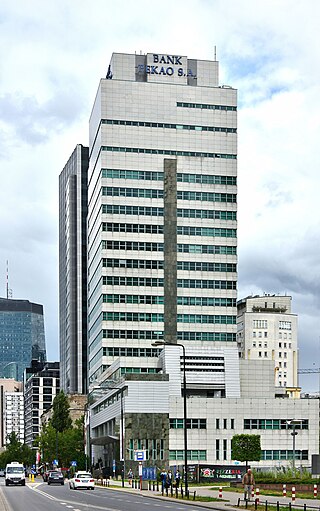
Bank Polska Kasa Opieki Spółka Akcyjna, commonly using the shorter name Bank Pekao S.A., is a universal bank and currently the second largest bank in Poland with its headquarters in Warsaw. The Italian bank UniCredit used to own 59% of the company. It sold the bank in December 2016. Now Powszechny Zakład Ubezpieczeń owns 20% of the company, Polish Development Fund 12.80%, UniCredit 6.28% and others 60.94%.
A national development bank is a development bank created by a country's government that provides financing for the purposes of economic development of the country.
French-Polish Rail Association was a Joint-stock company, established in 1931 to complete construction and then usage of the Polish Coal Trunk-Line. Its offices were in Paris, Warsaw, and Bydgoszcz. Its manager in chief was a Frenchman, Charles Laurent.
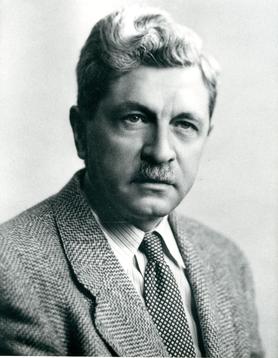
Wiesław Domaniewski was a Polish businessman, financial adviser and economist, as well as one of the founders of the association Polish Veterans of World War II. He served as president of the Józef Piłsudski Institute of America in the years 1969–1972.
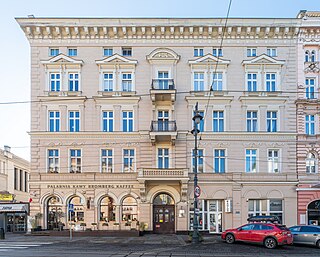
Emil Bernhardt House is a tenement located at 16 Gdańska Street, in Bydgoszcz, Poland.

The Belt and Road Initiative, known within China as the One Belt One Road or OBOR/1B1R for short, sometimes referred to as the New Silk Road, is a global infrastructure development strategy adopted by the Chinese government in 2013 to invest in more than 150 countries and international organizations. It is considered a centerpiece of the Chinese leader Xi Jinping's foreign policy. The BRI forms a central component of Xi's "Major Country Diplomacy" strategy, which calls for China to assume a greater leadership role for global affairs in accordance with its rising power and status. It has been compared to the American Marshall Plan. As of August 2023, 155 countries were listed as having signed up to the BRI. The participating countries include almost 75% of the world's population and account for more than half of the world's GDP.
The European Long-Term Investors Association (ELTI) aisbl represent a European-wide network of National Promotional Banks and Institutions (NPBIs). As of May 2020, the association gathers 31 European long-term financial institutions from 23 Member States across the European Union and Turkey.

The Polish Development Fund (PFR) (Polish: Polski Fundusz Rozwoju) is a state-owned financial group, headquartered in Warsaw, which offers instruments supporting the development of companies, local governments and individuals, and invests in sustainable social development and national economic growth.

The Three Seas Initiative, known also as the Baltic, Adriatic, Black Sea (BABS) Initiative or simply as the Three Seas, is a forum of thirteen states, in the European Union, running along a north–south axis from the Baltic Sea to the Adriatic and Black Seas in Central and Eastern Europe. The Initiative aims to create a regional dialogue on questions affecting the member states.
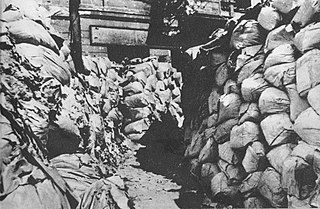
The barricade on Jerusalem Avenue was a defense structure built and manned by soldiers of the Bełt and Kilinski Battalions of the Home Army to protect a narrow passage between North Downtown to South Downtown during the Warsaw Uprising in 1944. It was located between 23 and 27 Jerusalem Avenue in Warsaw.
Michał Jan Chyczewski is a Polish manager, financier and government official.

The Bank Krajowy, full name Bank Krajowy dla Królestwa Galicji i Lodomerii wraz z Wielkim Księstwem Krakowskim, was a government-owned financial institution, established in 1881 by the Diet of Galicia and Lodomeria in Lemberg, now Lviv. In 1920, its seat was relocated to Warsaw and its name changed to Polski Bank Krajowy. In 1924, it was merged into the newly created Bank Gospodarstwa Krajowego.



















